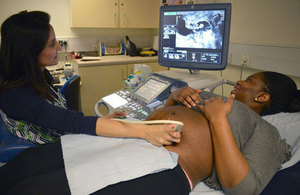Earlier screening for serious abnormalities in pregnancy
Today the UK National Screening Committee announced earlier screening for rare genetic conditions, Trisomy 18 and Trisomy 13, to help women.

Pregnancy
The UK National Screening Committee (UK NSC) has recommended earlier screening during pregnancy to test babies for Edward’s Syndrome and Patau’s Syndrome.
The conditions, also known as Trisomy 18 and Trisomy 13, are rare but very serious chromosomal (genetic) abnormalities which affect about 2 out of every 10,000 births in the UK each year. Most babies affected by these conditions will die before or shortly after birth.
Dr Anne Mackie, Director of Programmes for the UK NSC, which is supported by Public Health England, said:
Over 700,000 women get pregnant in the UK every year, and although 95% of these pregnancies will be perfectly healthy, sadly in a few cases, there are problems affecting the baby’s development. This recommendation would give women access to support and enable them to make important choices at an earlier stage of their pregnancy.
Edward’s Syndrome and Patau’s Syndrome can be detected through a scan which is currently offered to all women between 18 and 20 weeks of pregnancy in England as part of the NHS Fetal Anomaly Screening Programme. However, earlier testing combining a blood test and scan during the woman’s first trimester of pregnancy can identify whether the woman has an increased risk of having a baby with one of these conditions.
Through the screening programme, parents can access specialist support before their baby is born and discuss their options leading to appropriate care if it is needed.
The recommendation was made at the UK NSC committee meeting in June 2014, the minutes of which are published today. Also at the meeting the UK NSC considered national screening for atrial fibrillation, type 2 diabetes and parvovirus B19 infection, but based on the best available evidence decided against a screening programme for all 3 conditions.
Atrial fibrillation
Atrial fibrillation (AF) is an erratic heartbeat which is generally not life threatening but may be a risk factor for other conditions such as stroke. Screening for AF for over 65 year olds is not recommended as it is not clear that screening would benefit those identified. The evidence review highlighted issues with the available test and the treatment (drugs to thin the blood). The treatment is complicated and further work needs to be done to improve its application in order for people to benefit fully.
Type 2 diabetes
The UK NSC decision not to screen for type 2 diabetes was based on evidence that shows that population screening for this condition is not effective in improving the overall health for those identified as at risk.
Parvovirus B19 infection
The UK NSC reviewed the screening policy for susceptibility to parvovirus B19 infection in pregnant women for the first time. There are currently no interventions, such as a vaccine, to prevent adults from being infected, or prevention methods to stop the baby being passed the infection if the mother is infected. Therefore the UK NSC recommended against routine screening for susceptibility to the infection.
The UK NSC will review these recommendations again in 3 years as part of its regular evidence review process or earlier if significant new evidence becomes available.
Notes to editors
- The draft minutes from the UK NSC meeting on 18 June 2014 are available on the UK NSC website.
- The UK NSC’s recommendation for earlier screening for Edward’s Syndrome and Patau’s Syndrome will now be considered by a working group to look at how the screening test could be implemented across England as part of the current NHS Fetal Anomaly Screening Programme. The UK National Screening Committee is independent of, but supported by Public Health England (PHE).
- PHE exists to protect and improve the nation’s health and wellbeing and reduce health inequalities. It does this through advocacy, partnerships, world-class science, knowledge and intelligence, and the delivery of specialist public health services. PHE is an operationally autonomous executive agency of the Department of Health. www.gov.uk/phe
- Follow us on Twitter @PHE_Screening
UKHSA press office: screening